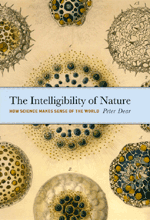Review: Dear, The Intelligibility of Nature
 In the modern era one would suppose it is fairly unlikely that a relatively educated, technologically savvy American populace could be accused of confusing physics with metaphysics. However, Peter Dear’s new book The Intelligibility of Nature: How Science Makes Sense of the World employs a detailed historical analysis using the critical terms of intelligibility versus instrumentality to show how they frequently are, and have been conflated. A recent review for Publisher’s Weekly explains:
In the modern era one would suppose it is fairly unlikely that a relatively educated, technologically savvy American populace could be accused of confusing physics with metaphysics. However, Peter Dear’s new book The Intelligibility of Nature: How Science Makes Sense of the World employs a detailed historical analysis using the critical terms of intelligibility versus instrumentality to show how they frequently are, and have been conflated. A recent review for Publisher’s Weekly explains:
“Cornell historian of science Dear (Revolutionizing the Sciences) here looks at central developments in Western science since the 16th century in terms of intelligibility versus instrumentality. His distinction asks of any given theory: does its success depend on its claims to expressing something about the nature of reality, or on its ability to produce experimental results?” According to Dear, one might be surprised to learn how often we fail to make this vital distinction.
The review goes on to praise Dear’s work for applying this insight to “nuanced discussions of, for example, the way Newton’s contemporaries viewed his work on gravity, the early development of the mechanical world view from the Aristotelian perspective, and the fundamental differences between the Copenhagen group’s approach to quantum physics and David Bohm’s.”
A pithy evaluation of the relationship between science and modern culture, Publishers Weekly calls Dear’s The Intelligibility of Nature “science history at its best.”